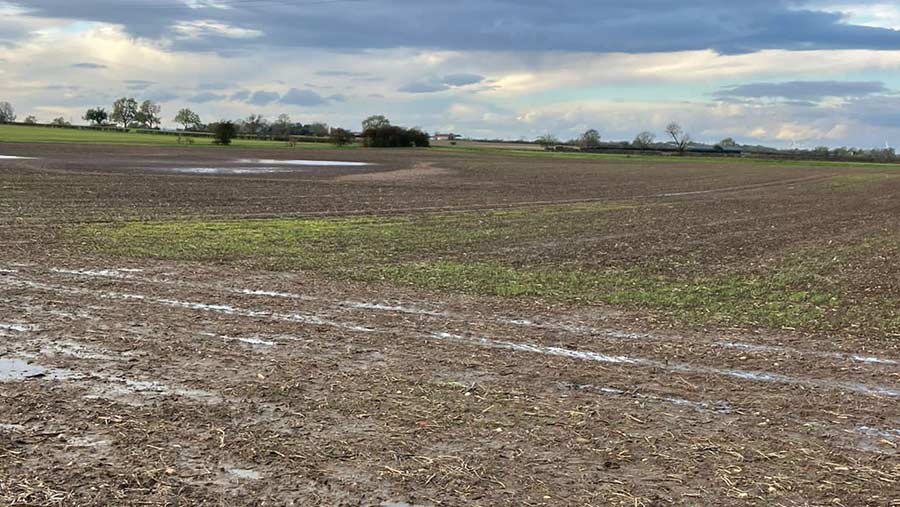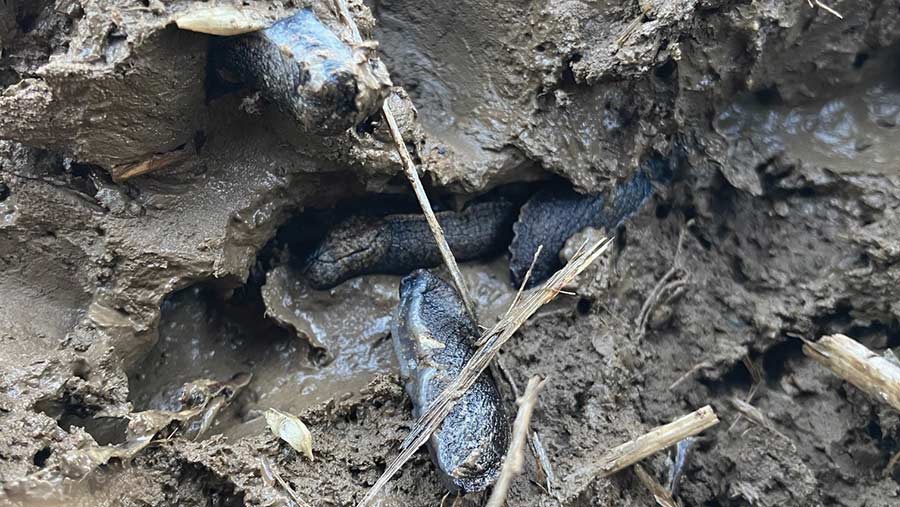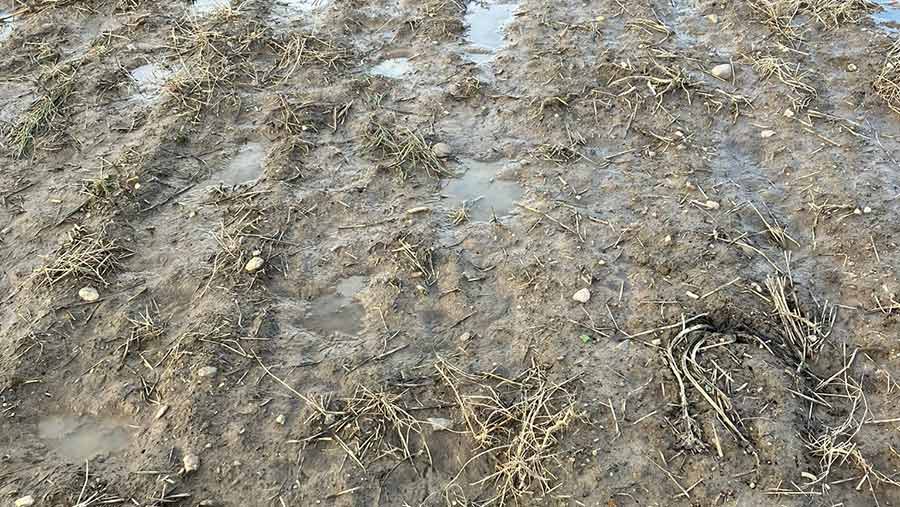How to manage waterlogged soils in an autumn deluge
 © Richard Boldan
© Richard Boldan This season’s washout autumn has seen crops battered by flooding and swamped by slugs, in what was the wettest October in England since 2000.
In fact, some fields have been written off completely as seed rots in the ground.
East Yorkshire agronomist Richard Boldan explains that most growers in the region have managed to get winter cereals drilled, but crops planted in the last 10 days of October are looking poor.
He predicts one-third of later-drilled crops will be terminated due to poor establishment and a considerable shift to spring cropping and environmental fallow schemes.
See also: UK wheat area drop and shift to spring drilling is forecast
“Soils are so waterlogged, I can’t see growers getting back on the land until the spring. So unless there is a severe dry spell, I’m recommending clients shut the gate on field work,” says Richard, who works for agronomy firm Edaphos.
He notes that this year’s autumn deluge looks set to have greater financial implications than the autumn of 2019, which saw a similar deluge.
“The difference in 2019 was the rain fell earlier, which prevented drilling, whereas this season growers got fields planted but have since lost crops and the cost of seed, fuel, herbicides and labour.”
Slugs have also been hugely problematic. “I have never seen anything like it in 35 years of farming and agronomy. Entire fields of oilseed rape and wheat have been lost to slugs,” he says.

© Richard Boldan
Weed control
What’s more, many winter crops have not received a herbicide programme. “Some growers were lucky enough to get an early pre-emergence herbicide on before the storms, but many have not.
“There may be an application opportunity, but if another rain spell follows, it will only stress crops further.”
On sloping land Richard warns growers of leaching and run-off risks, particularly when applying propyzamide to oilseed rape, as this active is under close scrutiny by the water authorities.
With untrafficable fields, growers will be forced into post-emergence sprays of products such as pendimethalin and flufenacet.
“Remember to check label requirements, as many residuals such as Proclus (aclonifen) and Avadex Factor (tri-allate) are not approved for post-emergence use.”
In extreme cases, where no blackgrass control has been possible in oilseed rape, Richard has advised some growers to terminate crops with an application of glyphosate to minimise the weed burden and benefit the long-term rotation.

Richard Boldan © Jim Varney
Foliar phosphorus
Wet soils restrict root development as crops struggle in anaerobic conditions, so an early spring-applied phosphorus spray, possibly with an easily metabolisable carbon source and amino acids, can promote rooting and give crops an energy boost, adds Richard
Shallow rooting from the wet autumn will be particularly problematic if there is a dry spring, which will compound drought issues.

© Richard Boldan
Shift to spring cropping, late-drilled wheat or SFI?
A shift towards spring cropping looks likely as crops are lost and the drilling window narrows.
Growers are advised to promptly place spring seed orders as availability could be limited.
Farm-saved seed is also a viable option. Remember to pay royalty fees and test grain for sowing potential.
Late-drilled winter wheat remains an option and all recommended varieties can be safely drilled until the end of January if seed-beds are suitable.
A number of popular varieties are safe into February. Seed rates will need to be increased accordingly.
Remember, if crops are drilled after November average establishment rates tend to fall and emergence will be slow.
As noted in the AHDB wheat growth guide, an accumulative soil temperature of 150C days is needed between sowing and emergence.
This can take up to a month longer in later-drilled crops planted into cold, wet soils.
“There is the temptation to plant late-drilled wheat on a frost when soils are trafficable, but growers need a settled spell, otherwise this could be a waste of time.
“Conditions after drilling are equally as important as those at drilling,” says agronomist Richard Boldan.
He also notes the shift in uptake of the Sustainable Farming Incentive as this offers a guaranteed income, which is increasingly appealing to farmers who have faced a disappointing harvest and now a challenging drilling season.
5 top tips for winter cereals this season
- If crops have not received a pre-emergence herbicide, wait until the spring to avoid further crop stress, unless a settled weather spell persists
- If opting for late-drilled wheat, ensure a prolonged settled spell. Conditions after drilling are just as important as the time of drilling
- Place spring seed orders as early as possible as availability may be limited
- Farm-saved seed remains an option. Test seed for quality and pay for royalties
- Apply a foliar phosphorus spray in the spring to stimulate root development

